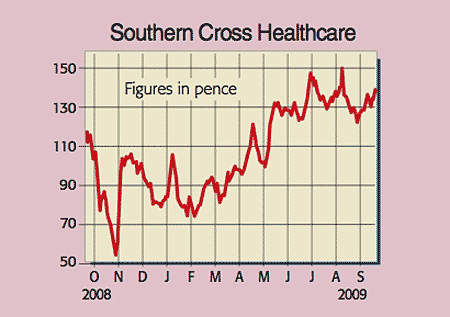Get the latest financial news, insights and expert analysis from our award-winning MoneyWeek team, to help you understand what really matters when it comes to your finances.
You are now subscribed
Your newsletter sign-up was successful
Want to add more newsletters?

Twice daily
MoneyWeek
Get the latest financial news, insights and expert analysis from our award-winning MoneyWeek team, to help you understand what really matters when it comes to your finances.

Four times a week
Look After My Bills
Sign up to our free money-saving newsletter, filled with the latest news and expert advice to help you find the best tips and deals for managing your bills. Start saving today!
Southern Cross Healthcare is the UK's largest retirement-home provider with an approximate 8% share of an £11.8bn market, managing 37,820 beds across 742 sites. These premises care for both the elderly (95% of sales) and young people with learning and physical disabilities (5%), with three-quarters of the residents requiring round the clock attention as they have been deemed by social services to be unable to live on their own.
So why has such a defensive stock fallen 75% since November 2007? During the era of cheap money, Southern Cross expanded too rapidly, saddling itself with onerous debt. When the credit crunch struck, not only did funding dry up, but its property values also dropped like a stone leaving the firm in breach of its banking covenants.
Since then, a new chief executive with turnaround experience has been appointed, and he has already got to grips with the company's problems. In October 2008, Southern Cross completed a major refinancing after a series of asset disposals, leaving proforma net debt of about £48m. This is well within conditions imposed by its lenders.
MoneyWeek
Subscribe to MoneyWeek today and get your first six magazine issues absolutely FREE

Sign up to Money Morning
Don't miss the latest investment and personal finances news, market analysis, plus money-saving tips with our free twice-daily newsletter
Don't miss the latest investment and personal finances news, market analysis, plus money-saving tips with our free twice-daily newsletter
Southern Cross Healthcare (LSE: SCHE)

The focus now is to tackle inconsistent service across the group's large portfolio of homes. A new inspection system has been implemented, with the target of having 80% of all homes rated excellent or good by 2011, compared to 71% today.
Assuming this is achieved without any significant capital expenditure, I'd predict 2009 revenues and Ebitda of £945m and £73m respectively, rising to £1.05bn and £82m by 2011. On this basis, using a 12% discount rate and a six times Ebitda multiple, I value the shares at around £2 each, offering 47% upside on today's price.
As usual there are, of course, risks. Southern Cross could be affected by high operational gearing, further falls in commercial property values, and cut-backs on care spending from cash-strapped councils and the NHS, which account for 77% of turnover. (A typical resident at one of Southern Cross's homes costs the government around £27,000 a year.)
However, taking all these factors into account, Southern Cross should nevertheless be a long-term beneficiary of demand from an ageing population, access to cheaper foreign labour, and a contraction in the number of houses available as rival sites close owing to stricter regulation.
Recommendation: speculative BUY at 136p (market capitalisation £256m)
Get the latest financial news, insights and expert analysis from our award-winning MoneyWeek team, to help you understand what really matters when it comes to your finances.
Paul gained a degree in electrical engineering and went on to qualify as a chartered management accountant. He has extensive corporate finance and investment experience and is a member of the Securities Institute.
Over the past 16 years Paul has held top-level financial management and M&A roles for blue-chip companies such as O2, GKN and Unilever. He is now director of his own capital investment and consultancy firm, PMH Capital Limited.
Paul is an expert at analysing companies in new, fast-growing markets, and is an extremely shrewd stock-picker.
-
 Should you buy an active ETF?
Should you buy an active ETF?ETFs are often mischaracterised as passive products, but they can be a convenient way to add active management to your portfolio
-
 Power up your pension before 5 April – easy ways to save before the tax year end
Power up your pension before 5 April – easy ways to save before the tax year endWith the end of the tax year looming, pension savers currently have a window to review and maximise what’s going into their retirement funds – we look at how